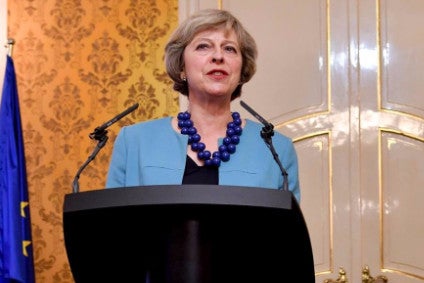
British Prime Minister, Theresa May has confirmed the UK will not remain a member of the EU trade bloc’s Single Market but will seek access to it through a Free Trade Agreement, which she says could see the automotive sector trading using Single Market “arrangements.”
In a speech outlining 12 aspects of the intensely complex mechanism by which Britain will exit the European Union (EU), May also warned those opposed to the UK quitting Brussels: “This is not a game,” as she added London did want some form of customs agreement.

Discover B2B Marketing That Performs
Combine business intelligence and editorial excellence to reach engaged professionals across 36 leading media platforms.
The UK Society of Motor Manufacturers and Traders (SMMT) has long pushed for free and unfettered trade with Europe and chief executive, Mike Hawes welcomed Theresa May’s recognition of the importance of Single Market arrangements for the automotive sector as “critical.”
He added: “We need government to deliver a deal which includes participation in the Customs Union to help safeguard EU trade, trade that is tariff-free and avoids the non-tariff and regulatory barriers that would jeopardise investment, growth and consumer choice.
“Achieving this will not be easy and we must, at all costs, avoid a cliff-edge and reversion to WTO tariffs, which would threaten the viability of the industry.”
The British Prime Minister is now firmly nailing her colours to a deal that excludes the UK from the Single Market, but which leaves open the door to it if Member States can agree Free Trade Agreements.
“What I am proposing cannot mean membership of the Single Market,” said May. “Being out of the EU but a member of the Single Market would mean complying with the EU’s rules and regulations without having a vote on what those rules and regulations are. It would mean to all intents and purposes, not leaving the EU at all.
“We do not seek membership of the Single Market – instead we seek the greatest possible access to it through a Free Trade Agreement. That may take in elements of Single Market arrangements in the export of cars and lorries for example, as it makes no sense to start again from scratch when we have adhered to the same rules for so many years.
“So an important part of the new strategic partnership we seek with the EU will be the pursuit of the greatest possible access to the Single Market, on a fully reciprocal basis, through a comprehensive Free Trade Agreement. I want Britain to be able to negotiate its own trade agreements. But I also want tariff-free trade with Europe and cross-border trade there to be as frictionless as possible.
“That means I do not want Britain to be part of the Common Commercial Policy and I do not want us to be bound by the Common External Tariff. These are the elements of the Customs Union that prevent us from striking our own comprehensive trade agreements with other countries. But I do want us to have a customs agreement with the EU.
“Whether that means we must reach a completely new customs agreement, become an associate member of the Customs Union in some way, or remain a signatory to some elements of it, I hold no preconceived position. I have an open mind on how we do it. It is not the means that matter, but the ends.
“And those ends are clear: I want to remove as many barriers to trade as possible. And I want Britain to be free to establish our own tariff schedules at the World Trade Organisation, meaning we can reach new trade agreements not just with the European Union but with old friends and new allies from outside Europe too.”
And in an echo of the SMMT’s plea for there to be no “cliff edge,” the Prime Minister added: “It is in no-one’s interest for there to be a cliff-edge for business. We believe a phased process of implementation, in which both Britain and the EU institutions and member states prepare for the new arrangements that will exist between us will be in our mutual self-interest. This will give businesses enough time to plan and prepare for those new arrangements.
“I know some are calling for a punitive deal that punishes Britain – that would be an act of calamitous self-harm. We could not accept such an approach. I am clear – no deal for Britain is better than a bad deal for Britain. Because we would still be able to trade with Europe. We would be free to strike trade deals across the world.
“If we were excluded from accessing the Single Market – we would be free to change the basis of Britain’s economic model. But for the EU, it would mean new barriers to trade with one of the biggest economies in the world. It would jeopardise investments in Britain by EU companies worth more than half a trillion pounds. It would risk exports from the EU to Britain worth around GBP290bn (US$358bn) every year. And it would disrupt the sophisticated and integrated supply chains upon which many EU companies rely.
“We are a crucial – profitable – export market for Europe’s automotive industry, as well as sectors including energy, food and drink, chemicals, pharmaceuticals, and agriculture. These sectors employ millions of people around Europe. And I do not believe the EU’s leaders will seriously tell German exporters, French farmers, Spanish fishermen, the young unemployed of the Eurozone and millions of others, that they want to make them poorer, just to punish Britain and make a political point.
“This is not a game or a time for opposition for opposition’s sake. It is a crucial and sensitive negotiation that will define the interests and the success of our country for many years to come.”






